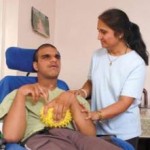
Chris Pell considers the findings of a recent observational study of non-verbal behaviour and communication in meetings of psychiatrists and patients with schizophrenia.
[read the full story...]
Chris Pell considers the findings of a recent observational study of non-verbal behaviour and communication in meetings of psychiatrists and patients with schizophrenia.
[read the full story...]
What needs to be done to ensure quality services for adults with profound and multiple learning disabilities and how can organisations ensure that this is done consistently?
Here, Nick Burton describes the findings of an Australian study that uses observational methodology to look in great detail at what was happening for a number of people in small 24hr staffed houses for four to six people.
[read the full story...]
Amy Green summarises a retrospective observational study that finds prenatal antidepressant exposure is associated with risk for ADHD, but not autistic spectrum disorders. She considers this complex topic and works out what it all means for pregnant women with depression.
[read the full story...]
Dave Steele reports on a recent observational case series published in the Lancet Psychiatry, which concludes that patients with mental illness are two and a half times more likely to be victims of homicide than the general population.
[read the full story...]
Background Understanding the communication of people with profound learning and multiple disabilities provides a daily challenge to those supporting them. There are a number of guides and aids available to support this process, such as those developed through Mencap’s Involve Me project We recently posted the results of a small study looking at the relationship [read the full story…]

This new report is an important addition to the evidence base specifically on case management and more generally in terms of interventions to reduce hospital admissions but, consistent with other studies in this area, can’t give definitive answers. Much of what already exists in relation to virtual wards is anecdotal or lacks detail and it’s [read the full story…]

The recent publication of Raising Our Sights, the DH report into support for people with profound intellectual and multiple disabilities set out a challenge for everyone concerned with understanding and responding to people with such disabilities. A number of projects have produced practical guides for involving and engaging with people, for example, Mencap’s Involve Me [read the full story…]

There is a body of literature looking at parental stress for parents of children with disabilities, but the researchers in this Canadian study were interested in looking specifically at a comparison of parental stress for parents of children with foetal alcohol spectrum disorder (FASD) and those with children with autism spectrum disorder. They reported the [read the full story…]

Introduction This study, carried out in Scotland, is relevant to commissioners and general practitioners, as it demonstrates why there are variations in prescribing practice, and how these can be managed. The authors have noticed that there is “significant variation in the quality of prescribing” and they have carried out an ethnographic study into why [read the full story…]

While depression is the leading cause of disability for both males and females, the burden of depression is 50% higher for females. In fact, depression is the leading cause of disease burden for women in both high-income and low- and middle-income countries (WHO, 2008). Research has shown that women with unidentified and untreated maternal depression [read the full story…]